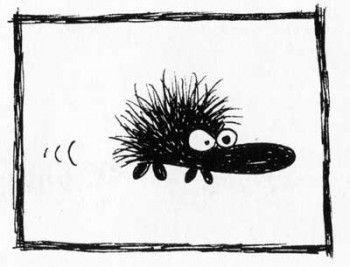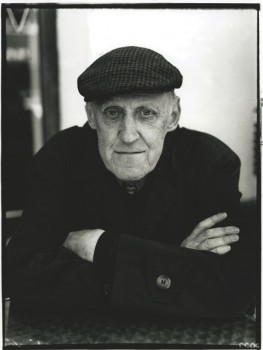Search results for "2011/04/2010/05/song-without-words"
Troubled waters
31 March 2005 | Archives online, Fiction, Prose
Extracts from the novel Den amerikanska flickan (‘The American girl’, Söderströms, 2004). Introduction by Pia Ingström
Doris Night&Sandra Day, Sandra Night&Doris Day: those were their alter ego identities for the game, which also involved the smiles they’d practised in front of the mirror at the bottom of the empty swimming pool, in the house in the muddier part of the woods.
‘We’re two clairvoyant sisters,’ said Doris Flinkenberg. ‘We got that way because of tragic circumstances. The poltergeist phenomenon. Do you know what that is?’
Sandra Wärn shook her head, but looked expectantly at Doris, the perennial crossword – solver, with dictionary to hand, who continued. ‘It’s when the innocent child has been badly abused and has developed supernatural powers in order to survive. Powers to see behind what’s there,’ Doris Flinkenberg explained. ‘To see what no one else can see.’
‘You and I, Sandra,’ Doris confirmed. ‘We were badly abused. I with my scars and you with your tragic family background, your mother and her lover, all of that. You and I, Sandra, we know what it is to suffer.’ More…
Paris 2
30 September 1987 | Archives online, Fiction, Prose
An extract from the novel Paholaispoika (‘The devil boy’, 1987). Introduction by Austin Flint
You must sit down, sayes Love, and taste my meat:
So I did sit and eat.
(George Herbert)
The city was the sum of the whole century, the capital of the eighteen hundreds, of no particular country. Like millions of others, I passed time reading the newspapers and keeping up with what was happening in Europe. Acorns would get crushed. There were many omens of how everything would turn out.
There were still a few remnants of the World’s Fair over by the Palais Royal. Not very many. The latest and most shocking incident was that the Lipschitz sculpture, ‘Prometheus Strangling the Vulture’, had been chopped to bits. Then it was put into storage, in some secret place. Crumbling rough grey stone that gave no idea of its shape. Rumour had it that the statue had offended official policy, and all sorts of things were certainly in the air. There was no longer any sign of the sculpture near the Palais Royal. More…
The stone’s silence
30 June 2000 | Archives online, Fiction, poetry
From Kiven vaitiolo (‘The stone’s silence’, Tammi, 1999). Introduction by Peter Mickwitz
I buried you
in an onion field
the way to take care of a love whose stems
suddenly rupture, tubes break
the earth's covered by
chickweed, goose foot and red-veined
leaves of sorrel, deep down
the inflamed wound, as sand that glints
in the soil, underground
golden domes and weeping under the crust
I tear
with dry hands the green and you do not hear
because you are cry and dirt
and onion and God and a man who's been thought
into the ground
and the sun is wise and hot, underground
the trees' root systems are fishing
for strength
there is enough left for a sigh
Seekers and givers of meaning: what the writer said
2 October 2014 | This 'n' that
 ‘All our tales, stories, and creative endeavours are stories about ourselves. We repeat the same tale throughout our lives, from the cradle to the grave.’ CA
‘All our tales, stories, and creative endeavours are stories about ourselves. We repeat the same tale throughout our lives, from the cradle to the grave.’ CA
‘Throughout a work’s journey, the writer filters meanings from the fog of symbols and connects things to one another in new ways. Thus, the writer is both a seeker of meaning and a giver of meaning.’ OJ
‘Words are behind locks and the key is lost. No one can seek out another uncritically except in poetry and love. When this happens the doors have opened by themselves.’ EK
‘I realised that I had to have the courage to write my kind of books, not books excessively quoting postmodern French philosophers, even if that meant laying myself open to accusations of nostalgia and sentimentality.’ KW
‘If we look at the writing process as consisting of three C:s – Craft, Creativity and Chaos – each one of them is in its way indispensable, but I would definitely go for chaos, for in chaos lies vision.’ MF
‘In the historical novel the line between the real and the imagined wavers like torchlight on a wall. The merging of fantasy and reality is one of the essential features of the historical novel.’ KU
‘The writer’s block isn’t emptiness. It’s more like a din inside your head, the screams of shame and fear and self-hatred echoing against one another. What right have I to have written anything in the first place? I have nothing to say!’ PT
‘…sometimes stanzas have to / assume the torch-bearer’s role – one / often avoided like the plague. / Resilient and infrangible, the lines have to / get on with their work, like a termite queen / laying an egg every three seconds / for twenty years, / leaving a human to notice / their integrity. ’ JI
In 2007 when Books from Finland was a printed journal, we began a series entitled On writing and not writing; in it, Finnish authors ponder the complexities, pros and cons of their profession. Now our digitised archives make these writings available to our online readers: how do Claes Andersson, Olli Jalonen, Eeva Kilpi, Kjell Westö, Monika Fagerholm, Kaari Utrio, Petri Tamminen and Jouni Inkala describe the process? Pain must coexist with pleasure…
From 2009 – when Books from Finland became an online journal – more writers have made their contributions: Alexandra Salmela, Susanne Ringell, Jyrki Kiiskinen, Johanna Sinisalo, Markku Pääskynen, Ilpo Tiihonen, Kristina Carlson, Tuomas Kyrö, Sirpa Kähkönen – the next, shortly, will be Jari Järvelä.
The anchor
31 March 1990 | Archives online, Fiction, Prose
An extract from the novel Leo (Söderströms, 1989). Introduction by Marianne Bargum
A summer quickly goes by and the beginning of autumn rolls merrily away. The middle of October is the time when things start slackening off, the harvest over, the flax brought in and the time for slaughter approaching. It is growing darker and the storm rumbles over the village, howling even more wildly out there in the darkness where the ships are gradually beginning to struggle home.
In stormy weather, we become touchy and angry. We think about those out there, and are irritated by minor matters people safe on the mainland make such a furore about. We conscientiously go to church the nearer autumn looms, and there we pray ardently for all those in peril on the sea. But then we have the pastor in the pulpit, irritable and angry like the rest of us, and he takes the opportunity to give us a reminder.
‘Out there in the storm the skipper calls on God, but when the storm dies down, he gives thanks for his own skill’, he begins. So you can work out what is to follow. Not very edified, we make our way home in the mud, in the cold wind, a shoulder like a wedge ahead of us. More…
Funny stuff
1 April 2009 | In the news

Milla Paloniemi's swearing hedgehog
For the first time, comic books rule the latest bestsellers list of Finnish fiction.
A cartoon series called Fingerpori by Pertti Jarla evidently tickles the Finnish funny bone, as three of his collections occupy the second, sixth and eighth places on the February top ten list, compiled by the Booksellers’ Association of Finland. More…
The mighty word
15 November 2012 | Fiction, Prose
‘Mahtisana’, a short story from the collection Lapsia (‘Children’, 1895). Introduction by Mervi Kantokorpi
Mother and Dad hadn’t said a single word to each other since lunchtime. The children, Maija and Iikka, were quiet, too. They sat apart, Iikka on the chair at the end of the sofa, where he could see the moon through the window, and Maija next to the window looking out on the street, where children moved about on skis and sleds. They didn’t dare make a sound, not even a whisper to ask for permission to go outside. It had been so quiet all that Sunday evening that when Mother spoke, encouraging them to go out and play, both of them nearly jumped.
They left without saying a word, Maija creeping quite silently. Even out in the courtyard she and Iikka still spoke in whispers as they decided which hill to go to. They didn’t really want to go anywhere, but when they came out to the street and could hear the happy shouts of children from every direction, it refreshed their spirits. Maija sat Iikka down on the sled and set off at a run, pulling him behind her. She felt as if her gloomy mood was falling away in pieces to be trampled underfoot.
A few streets down there was a large crowd of boys on the corner. They decided to go and see what was happening. More…
Metamorphoses
30 June 1992 | Archives online, Fiction, Prose
Extracts from the novel Tummien perhosten koti (‘Home of the dark butterflies’, Kirjayhtymä, 1991). Introduction by Soila Lehtonen
The girl is on the rock every evening.
By the side of the sheltered bay, she knits or reads a book. Sometimes she simply lies, motionless, under a large towel, her closed face towards the sun as it sinks into the sea.
She has undone her thick plait. Sometimes her hair lies against the reddish boulder like a fan. As if it had been placed there deliberately.
She does not notice the boy, who can move soundlessly. More…
New from the archives
19 February 2015 | This 'n' that

Tua Forsström. Photo: Mao Lindholm
Some weeks the digitisation project turns up material we’ve all but forgotten about; other times it’s like greeting an old friend. The poet Tua Forsström’s voice belongs in the second category: quintessentially feminine, wise, simultaneously vulnerable and strong, she is a quiet, watchful observer of everyday life, fixing the chimerical, the evanescent not with, it seems, but between, the words of her poems. This extensive selection of poems is introduced by her friend and fellow poet, Claes Andersson.
Born in Porvoo in 1947, Forsström publishes rarely. She won the Nordic Council Literary Prize in 1998 with Efter att ha tillbringat en natt bland häster (‘After having spent a night with horses’, 1997). Her breakthrough into the English-speaking world came in 1987 with her sixth collection, Snow Leopard (Snöleopard), which was translated into the English by David McDuff and published by Bloodaxe Books. We’ve featured her work regularly, including her most recent collection, En kväll i oktober rodde jag ut på sjön (‘One evening in October I rode out on the lake’, Söderströms, 2012), with an introduction by Michel Ekström.
*
The digitisation of Books from Finland continues apace, with a total of 358 articles and book extracts made available online so far. Each week, we bring a newly digitised text to your attention.
Writing letters
30 December 2001 | Fiction, Prose
From Meddelande. Noveller i urval 1971–1997 (‘Messages. Selected short stories 1971–1997’, Schildts, 1997)
I’ll make it to Maritim, got hold of Gustafsson, van coming at 8, have redirected mail to summer address, bye kiss Tooti
Take last things out of fridge
Hi my name is Olavi. You write well but last time you didn’t make a happy ending. Why do you do this?
We look forward to your valued reply soonest concerning Moomin motifs on toilet paper in pastel shades
Don’t say too much if they ring, don’t promise yet. Bye Tooti
Hi! We’re three girls in a mad rush with our essays about you could you help us by saying in just a few words how you started writing and why and what life means to you and then a message to young people you know the kind of thing. Thanks in advance More…




 For an extraordinary period between 1944 and 1956 part of Finland – the Porkkala peninsula, close to Helsinki – was leased to the Soviet Union as a military base. Inspired by the photographs by Jan Kaila, Olli Jalonen explores those silenced and mysterious years, which prompted Finns to ask the question: what if the whole of Finland had succumbed to the same fate?
For an extraordinary period between 1944 and 1956 part of Finland – the Porkkala peninsula, close to Helsinki – was leased to the Soviet Union as a military base. Inspired by the photographs by Jan Kaila, Olli Jalonen explores those silenced and mysterious years, which prompted Finns to ask the question: what if the whole of Finland had succumbed to the same fate?